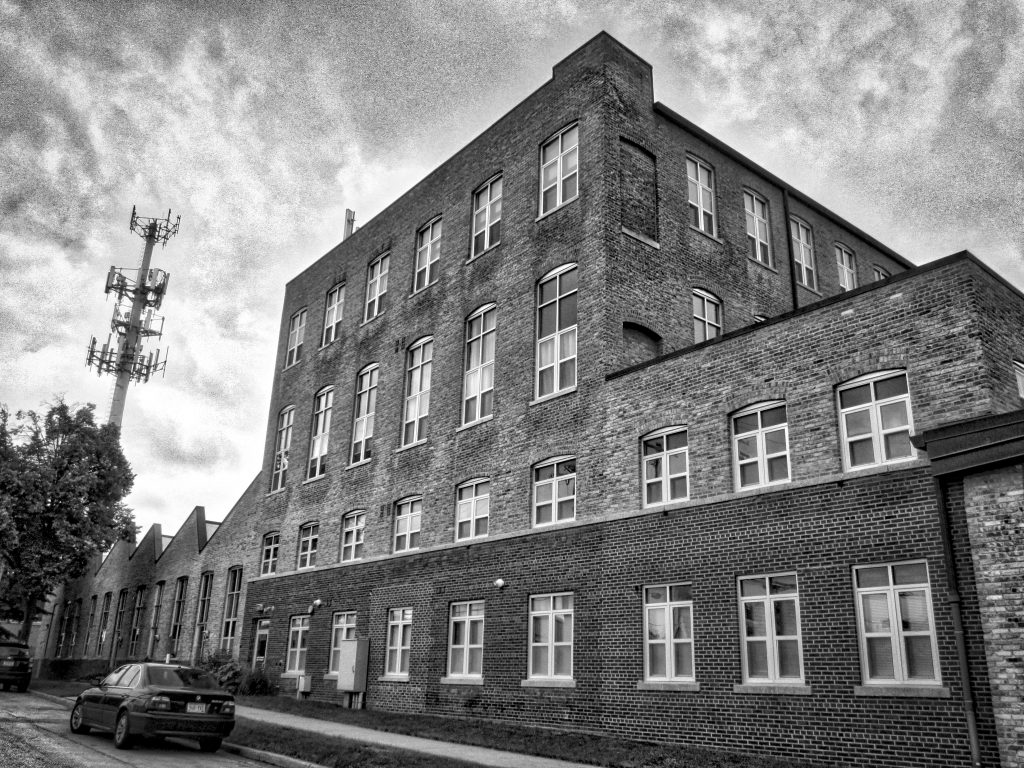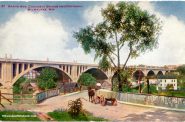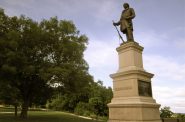When Police Handed Out Courtesy Cards
And how the arrest of a Riverwest business owner ended the practice.

The Hi Fi Lofts Condominiums building at 3059 N. Weil St., is the former home of J.W. Speaker Co., which originally manufactured tire repair kits. Carl Swanson photo
The courtesy cards once issued by Milwaukee Police to a favored few weren’t Monopoly board game style Get Out of Jail Free passes, but one might be excused for thinking they might be. Light blue in color, the wallet-sized cards read, “The courtesies of the Police Department of the City of Milwaukee are extended to [name].” Each courtesy card was dated and signed by the chief of police.
It’s not known when the cards first appeared, but no more were issued after September 22nd, 1950, the day an angry Police Chief John W. Polcyn told the Milwaukee Journal the long-standing practice would end.
Polcyn, a former Marine, had worked his way up from patrolman to chief. According to the Milwaukee Police Historical Society, the “hard-working, clear thinking, and ambitious” Polcyn was appointed to lead the department in 1945 and is remembered for his many innovations. To name just a few, he introduced the two-tone paint scheme Milwaukee’s police cars still wear, created the department’s narcotics squad, instituted its Police Aide apprenticeship program, and even established the city’s night parking permit system (the first of its kind in the nation).
The courtesy card kerfuffle was a rare public embarrassment for the chief, and it happened because of one man.
In 1935, John W. Speaker established a company to manufacture tire repair kits. The venture succeeded and soon the J.W. Speaker Co. moved into a large factory at 3059 N. Weil St. in Milwaukee’s Riverwest neighborhood and added radiator fronts, automotive lighting, and car and truck mirrors to its product mix.
During World War II, J.W. Speaker Co. developed the Heatab miniature stove and a simple folding can opener. Both were made in vast quantities and packaged with the rations used by the U.S. military. (The company, still operated by the Speaker family and now based in Germantown, today specializes in after-market vehicle lighting systems.)
Tragedy struck the J.W. Speaker factory in Riverwest on November 1949, when a massive explosion and fire instantly killed 20-year-old Dorothy Gruber. A second worker, Cora Schultz, died a few hours later of injuries suffered in the blast. She had just returned to work following her honeymoon. Four other employees were hospitalized with burns.
Speaker, busy in his office at the front of the plant, heard the blast and saw two injured workers running from the building. He went after them, loaded them into his car, and rushed to the hospital.
The explosion shattered windows in nearby buildings and left a 45-foot-long by 20-foot-high hole in the wall of the one-story drying room at the south end of the factory. It took the combined efforts of the plant’s sprinkler system, six fire engines, three ladder trucks, and a rescue squad to bring the fire under control.
Oddly, for a manufacturer of auto accessories, Speaker had a poor driving record. Seven months after the factory explosion, a motorcycle patrolman saw a car driven by Speaker weaving his way down North Prospect Avenue. When the officer tried to pull him over, Speaker abruptly swerved, nearly colliding with a taxi cab. When he finally did stop—parking four feet away from the curb, the officer noted—he failed sobriety tests, briefly scuffled with officers, and was charged with drunken driving. According to the June 2, 1950 edition of the Milwaukee Journal, Speaker had been fined 16 times previously for traffic offenses dating back to 1937.
When his case came to trial on September 20, 1950, Speaker was found guilty and fined $100. He also caused a sensation when he told the court of displaying his police courtesy card to the arresting officer, who, Speaker said, showed “anything but the usual courtesy.”
Two days later, Chief Polcyn ordered Speaker to come to police headquarters and surrender his card. “I’m going to tear it up in his presence,” Polcyn told the Journal. If Speaker failed to show, the chief said, “I will send an officer to bring him and his card in.” (As it happened, Speaker waited until just before the chief’s deadline—then sent the card by messenger.)
Polcyn told the newspaper the practice of issuing courtesy cards was an old custom he had inherited on taking office and only 20 or 22 cards were in circulation. He refused to provide a complete list of cardholders, but said they were mostly male, usually above middle age, and included the sheriff, a couple of union leaders, friends of the police, and a few lawmakers who might be expected to vote favorably on issues important to the department.
“It does help you get around among strangers if you have an extra means of introduction where you’re not known,” he told the Journal.
Polcyn added, “I’ve never liked the idea of these cards. They didn’t seem to me to be the sort of thing the police should issue. There was a bare chance they might be misused or misunderstood.”
Still, the chief was confident no Milwaukee officer would be swayed from his duty by being shown such a card. He pointed out Speaker had tried it and had been arrested anyway.
Who knows? Maybe he was right. Maybe no prominent citizen ever dodged a ticket by flashing a courtesy card, personally issued by the chief himself, at a lowly beat cop.
Or maybe when Speaker aired his complaint in open court in front of some suddenly very interested reporters, he had violated the first rule of the courtesy card, that being one does not talk about the courtesy card.
Carl Swanson is the author of the book Lost Milwaukee from The History Press, available from book stores or online.
Lost Milwaukee
-
Riverwest Had World’s Largest Color Printing Press
 Jun 11th, 2020 by Carl Swanson
Jun 11th, 2020 by Carl Swanson
-
The Mighty Grand Avenue Viaduct
 Apr 29th, 2020 by Carl Swanson
Apr 29th, 2020 by Carl Swanson
-
The Man Who Made Milwaukee
 Mar 9th, 2020 by Carl Swanson
Mar 9th, 2020 by Carl Swanson






















The article says Speaker was driving “down North Prospect Avenue” which implies he was driving south on a street that, today, is largely one-way north-bound.
This leads to the question of when Prospect (and Farwell) became one-way. Was it after streetcars stopped running (north- and south-bound) on Farwell between Ogden and North (which, according to the book “TM:The Milwaukee Electric Railway & Light Company”, happened on June 21, 1953)? By the time I became familiar with that area (the late 1950s) Farwell & Prospect were both one-way.
(I’m interested in the answer even if Mr. Speaker was driving north or was pulled over on a section of Prospect that is still two-way today.)